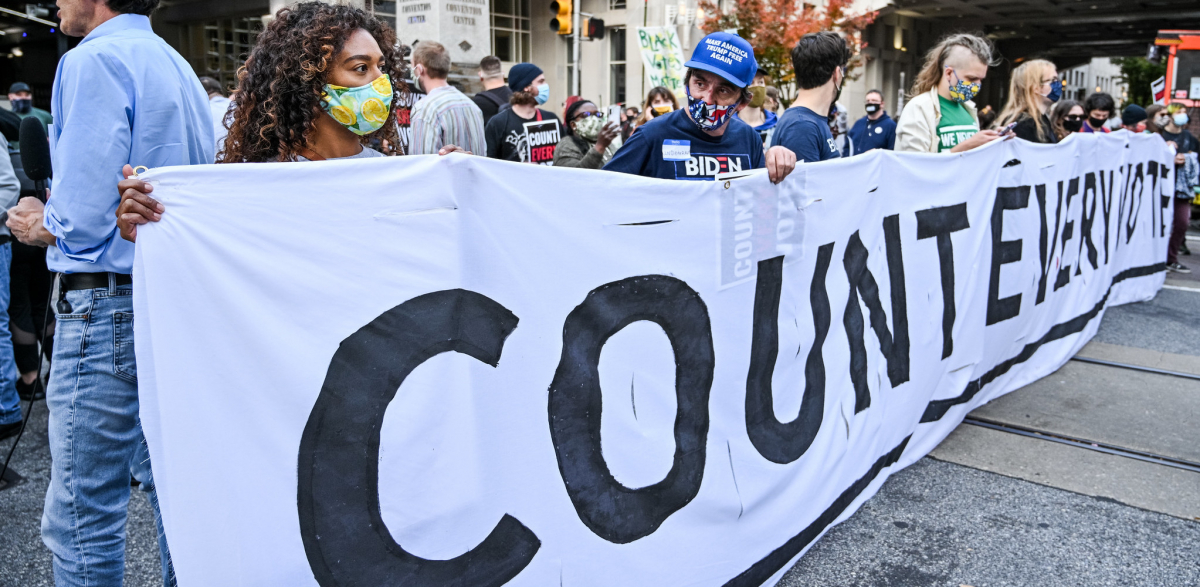We Need Democracy on the Job and in the Union, Too

Demonstrators rallied in Philadelphia in the wake of November's presidential election to demand that every vote be counted. Photo: Joe Piette, CC BY-NC-SA 2.0
Democracy is on everyone’s mind, after the presidential election and transition we’ve just weathered.
There’s the democracy we had to defend. Union members participated in all kinds of ways—from postal workers making sure the ballots were delivered, to UNITE HERE members canvassing Arizona and Georgia, to central labor councils calling for the results to be respected.
Then there’s the democracy we don’t have yet. The struggle to vote and have your vote counted has a long legacy in this country.
The ongoing disenfranchisement of African Americans—through suppression of the vote, limiting polling places, and purging voter rolls—is a challenge to the idea that we live in a democracy now. So is the wildly disproportional set-up of the Senate and the winner-take-all structure of the Electoral College.
Democracy remains an ideal to work toward and fight for—in more spaces than the voting booth. Like on the shop floor, and in the union.
WORKPLACE TYRANNY
Collective bargaining agreements give workers some control over their work lives. Still, it is kind of astonishing how little control most workers have over the place they spend so much time—and how little we demand actual democracy at work.
I’m often asked in trainings, “How do you keep workers engaged when there isn’t a contract fight?” The answer: grow power on the shop floor.
Don’t wait for an issue to be given to you; bring union members together to assert their solutions to workplace problems. For instance, draft a group letter. Confront a manager together. Or just implement a desired change yourselves, without waiting for permission.
Shop floor fights are critical to building power—not only defensive fights to stop a bullying boss or refuse speed-up, but also offensive fights that allow workers to control the pace and methods of our work.
Winning this kind of democracy—more control over our own work lives—requires another kind of democracy: workers meeting together, identifying concerns, and making plans for collective action.

SUPPORT LABOR NOTES
BECOME A MONTHLY DONOR
Give $10 a month or more and get our "Fight the Boss, Build the Union" T-shirt.
And you can’t do that without union democracy, which means more than fair and open elections. It also means transparent bargaining, with full member participation. It means discussing, disputing, and making collective decisions.
Too much of union communication goes in one direction: top-down, or maybe bottom-up, but rarely across. Democracy requires communication across: member to member.
DISCUSS, NOT JUST VOTE
When I was first president of the Massachusetts Teachers Association, the reform caucus that I came out of was a tiny minority of the board.
The members opposed to our caucus continually asserted that democracy meant the board’s authority as elected representatives. Whenever a vote was taken, they had the most votes, so they won and we would enact their motion.
Oftentimes it was a motion about an issue that had never been discussed with members.
Yes, a vote is the bottom line. But democratic unions are about more than motions passed. Union democracy includes education, discussion, and debate.
A democratic union brings members together to fight on the shop floor—but also to read, view films, and learn about politics. It offers members a range of ways to come together and solve problems through collective activity.
Some of the most vibrant democratic spaces I’ve witnessed in unions are in caucuses. That’s where members are talking to and educating each other, learning how to fight, learning why to fight. And some of the most anti-democratic union forces I have seen are those trying to stifle caucus development.
Labor’s commitment to democracy must be a whole lot more than elections—union or legislative. It must be an ongoing way of being the union.



